The economy grew by 12% in GDP terms last year while the domestic economy grew by just over 8%, according to new figures from the Central Statistics Office.
However, growth slowed in the final three months of last year compared to initial estimates and the domestic economy entered a technical recession.
The economy overall performed strongly last year with GDP up 12% and the domestic economy, measured by Modified Domestic Demand, grew by 8.2%.
Once again sectors dominated by multinationals like pharma and IT continued to grow their exports.
Consumer spending also held up across the year, up 6.6% across the year with more spent on services like foreign travel. Wages also grew strongly over the year by 7.8%.
However, growth in the final three months of last year was not as strong as first estimated earlier this year.
In GDP terms the economy grew by 0.3% compared to an initial estimate of 3.5%.
Modified Domestic Demand fell by 1.3%. This was the second consecutive quarter that growth in the domestic economy fell, which is the technical definition of a recession.
The CSO explained that a reduction from an exceptional level of investment by companies in equipment and data centres earlier this year explains much of the decline in growth numbers.

Irish GDP growth was again higher last year than any other euro zone economy, but so too was modified domestic demand when compared against GDP growth of other countries.
We need your consent to load this rte-player contentWe use rte-player to manage extra content that can set cookies on your device and collect data about your activity. Please review their details and accept them to load the content.Manage Preferences
Minister for Finance Michael McGrath said last week that his department expected the domestic economy to "effectively move sideways over the coming months", before returning to growth from the second quarter of the year.
In its last forecasts in September, the Department of Finance saw modified domestic demand slipping by 0.6% in the first quarter of 2023 before expanding by 0.8% from April to June and averaging 1.2% for the year as a whole.
In a statement today, Finance Minister Michael McGrath said he was encouraged to see that despite inflationary pressures, consumer spending increased by just over 1% in the final quarter, with similar growth recorded in the third quarter.
Overall, consumer spending was up 6.6% last year, above previous expectations.
"This reflects the strength of our labour market, with close to 2.6 million people in employment at the end of last year - a record level - and the targeted supports provided to households by the Government throughout last year," Mr McGrath said.
He said that since the start of this year, incoming data both domestically and internationally has suggested that the expected slowdown may not be as severe as previously anticipated.
"While inflation remains elevated, it is expected to ease from the second quarter of 2023. Yesterday's exchequer returns also showed continued strong momentum in tax receipts, with both income tax and VAT receipts remaining robust," the Minister added.





